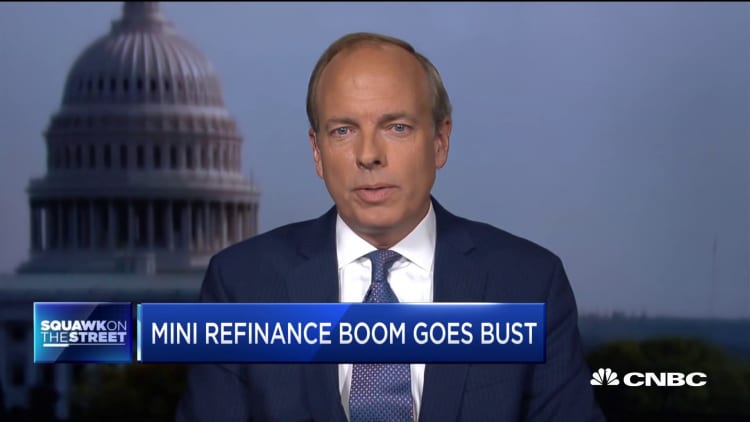With market volatility and trade tensions high, some of the smartest companies in the world just moved quickly on a straightforward, strategic financial plan: be opportunistic and control what you can.
Apple, Disney, Deere, Caterpillar and Coca-Cola were among blue-chip corporations that rushed back into the debt market the first week after summer's end with near $75 billion in issuance of U.S. investment grade corporate bonds, the most in a week since 1972. It's a type of financial thinking from the C-suite that occurred after a massive August decline in yields, which resulted in extremely low borrowing costs.
Individuals — in particular, homeowners who have not recently refinanced a mortgage — should be thinking like chief financial officers.
Mortgage rates loosely follow the yield of the 10-year Treasury which fell to a three-year low last week. In August, the 10-year Treasury yield fell about 50 basis points, one of the largest monthly declines of the post-financial crisis era.
"Companies are borrowing at lower costs than they could just a few months ago and it's the same thing in mortgage financing," said Benjamin Joseph, global fixed income expert at Morningstar. "Companies want to refinance and with such low rates we will see big companies with strong balance sheets that can add leverage at a very cheap price. ... It's an opportunistic valuation thing. The ability to refinance at 20 to 30, even 50 basis points lower, is a great opportunity."
U.S. investment grade yields are down from around 4.25% at start of 2019 to 2.85% at the end of August, according to data from CreditSights. Apple, Disney and Deere all issued 30-year bonds at yields below 3%, a first for the corporate bond market.

These corporations do have a unique advantage. Negative yields have become more common across the fixed-income world for both government and company bonds. German industrial giant Siemens recently issued a bond with a negative yield and, in all, there is now roughly $1 trillion in negative-yielding corporates, $17 trillion including government bonds. Investors are paying governments and corporations to hold their money instead of the government or company paying to borrow.
"There's been pent up demand for U.S. investment grade," said Jeffrey Khasin, investment grade strategist at bond research firm CreditSights. The August return for investment grade bonds of 3% was the sector's largest total return month since 2009. "If you are worried about volatility around trade or the Fed, or people taking profits and selling, investment grade looks better than high yield and equities," he said.
But that does not mean the recent yield declines don't have a parallel money lesson for the individual.
"If you have the responsibility as a corporation or individual to refinance, you might want to," said Joseph.
Thinking like a corporate treasurer always has been a wise way for a homeowner to think about the mortgage market and, right now, all of their credit relationships.
"There are certain things we can control. Refinancing debt is one of them. Hit up everyone you owe money to — the mortgage company, credit card company, consumer finance company," said Mitch Goldberg, president of Melville, New York-based investment advisory firm ClientFirst Strategy. "That's a surer bet than the stock and bond market if the economy slows."
What to know about mortgage refinancing
For most homeowners who plan to stay in their residence for the long-term and received a mortgage in the last three years, it is worth looking at a refinance opportunity now, said Mike Fratantoni, chief economist at the Mortgage Bankers Association.
"The most telling thing is that last time the refinance index was this high was three years ago in 2016, and that was same time that rates were similar to current levels," he said.
In November 2018, the 30-year fixed mortgage rate was around 5%. While it did not move down as much as some expected based on the August action in yields, last Thursday the 30-year fixed mortgage was 3.49%.
"In the April-May timeframe, maybe four million households had an incentive to refinance. At current rates it is more like 10 million households," said Fratantoni. "If you will be in a property for a long time, and it will take six to 12 months to break even on the costs, then it almost always would be a good deal."
The general rule of thumb is that you need to be able to save at least 0.5%, because of costs — from origination to title, insurance and appraisal — as well as the cost of the individual's time.
Many homeowners already took advantage of low rates in the decade since the Great Recession ended, with multiple peaks in refinance applications. "From 2009 to 2016, it was an unending refinance wave," Fratantoni said.
"If you've built up enough equity in your home and your finances are in order, now could be a great time to refinance your mortgage," said Zillow economist Matt Speakman. But he added, "Rates are not much lower than they were a few years ago, meaning it's likely that some people have already refinanced in recent years and are less motivated to do so again."
Refinancing activity has been heating up since earlier in the summer. But August saw a notable spike, and the Zillow economist noted that refinance activity from the past week was 152% higher than the same week last year, though that was actually a little lower than the previous few weeks' activity.
Refinance applications were up 38% in August, month-over-month, and tripled from the year-ago period. Some big Wall Street banks including Wells Fargo and Bank of America have been ramping up mortgage refinance operations.
Don't wait too long
Rates could go even lower. With the Federal Reserve expected to cut rates again at its mid-September meeting, and the market expecting multiple cuts before the end of the year, most bond experts agree that the declining yield trend will not reverse any time soon.
"The global economic uncertainty that has driven rates this low is unlikely to wane in the short term, although rates are always a threat to rebound sharply, particularly after a rally like the one we have had through most of this year," Speakman said.
Refinancing should not come down to an attempt to perfectly time rates, especial with fears of an economic slowdown and trade tensions as root causes of the decline in yields.
"Conditions can change quickly and make the availability of refinancing more scarce," Fratantoni said. "Unemployment increases and wage gains slow, and in many cases you might have credit that is not as strong as during booming times. The rates available for refinancing are for the strongest borrowers."
He said this level of uncertainty and volatility in the markets can make some people hesitate, but that can be the bigger mistake.
"When rates are tanking like this people and corporations are using it as a good opportunity to clean up their balance sheet and get a better finance profile," said Morningstar's Joseph. "Companies lever up before markets shut down. Markets are still open and rates low."
It is hard to imagine rates going up significantly any time in the near future, said bond strategist Khasin. "You might be able to refinance even lower, but look at what people were doing on the corporate side. They did not wait," Khasin said, noting that the $70 billion-plus in corporate bonds issued last week occurred over a three day-period ahead of Friday's monthly jobs report.
Return of money versus return on money
One of the key decisions in choosing to refinance debt is evaluating the cost versus other investment options. With stocks and bonds both up considerably year-to-date, the experts say it is another reason to look for alternatives outside the classic asset allocation of a market portfolio.
In 2019, bonds have generated investment returns almost in line with stocks, which is atypical. The Bloomberg Barclays Aggregate Index, the flagship U.S. bond benchmark, is on track for its best year since 2002. U.S. Treasurys, which are supposed to be the ultimate safe-haven asset, have generated an investment return similar to stocks.
"If you were just thinking that a 50-50 portfolio would balance risk, it's been the opposite," Joseph said.
"Rebalancing between stocks and bonds is basically not accomplishing much these days as both assets are up a lot," Goldberg said. "With absolute value high for stocks, bonds, and gold, it is time to be more concerned with a return of your money instead of a return on your money." He added, "It's a matter of taking control of something that is worthwhile amidst volatile financial markets."
This past week, Mohamed El-Erian, former CEO of bond giant Pimco and current Allianz chief economic adviser, said to CNBC about the current fixed-income environment, "If you stick with the old rules, you will lose ... you have to think differently about the bond market."
Speaking at a conference in Italy this past week, he added, "The bond market today is opportunistic, it is very different from the core allocation ... So look for opportunistic positioning."
It is time to say, 'Where is my money? How safe or unsafe is it? Do I have an acceptable debt level and what is my time horizon?' ... People are starting to do that. And most start with their house, and they are refinancing.Benjamin Josephglobal fixed income expert at Morningstar
Corporations raking in billions in attractive bond deals is another example of the rich getting richer. Companies including Apple are issuing billions in debt to pay down older debt and for other general corporate purposes, as well as fund more stock buybacks and shareholder dividends. Whether the corporate bond rush serves the Federal Reserve's larger goal is no sure thing.
After 10 years and amid fears of a slowdown, the Fed's first interest rate cut — and the cuts still expected by the market — are intended to stimulate the economy by making capital available to companies to invest and for individuals who can borrow at lower costs.
"Borrow money and spend and invest in the economy. ... That's the trick, and at some point, if companies are not investing, but just doing buybacks, then you have to ask, is it the real economy or just increasing the price of a stock?" said Joseph.
Fed chair Jerome Powell said on Friday, "I think it is the case that uncertainty around trade policy is causing some companies to hold back now on investment. ... So for businesses, to particularly make longer-term investments in plants or equipment or software, they want some certainty that the demand will be there."
When it comes to the ultra-cheap debt, though, the companies are taking what they can get, when they can get it. In that thinking, there's a lesson for everyone confused by everything else going on in the markets.
"These refinancing deals won't lead to a big economic boost but it does free up cash in a world where trade can pressure profitability or can get passed on to consumers and pressure profitability of consumers," said CreditSights' Khasin. "Being able to refinance was one more risk that now you are not facing anymore, and you were facing that in 2018 ... and it was a big one."
"It is time to say, 'Where is my money? How safe or unsafe is it? Do I have an acceptable debt level and what is my time horizon?"Joseph said. "And people are starting to do that. And most start with their house, and they are refinancing."







